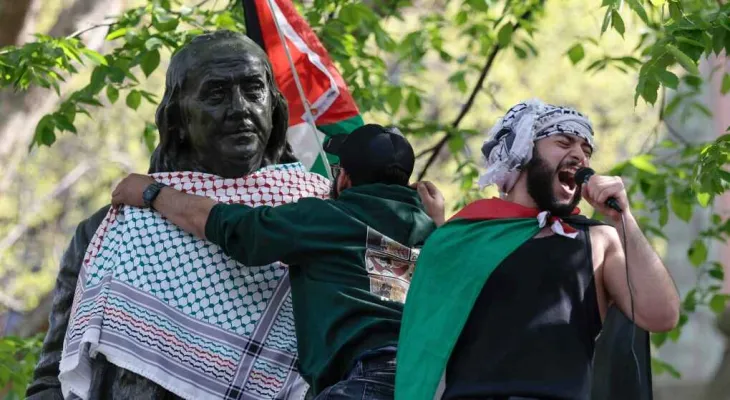Search here
Newspaper
Search here

Arab Canada News
News

Published: April 27, 2024
Students protesting the war between Israel and Hamas at universities across the United States, some of whom clashed with riot police, vowed on Saturday to continue their demonstrations, while many colleges condemned university presidents who called for law enforcement to disperse the sit-ins.
As Columbia University continues negotiations with those in a pro-Palestinian student encampment on the New York University campus, the university's senate passed a resolution on Friday to form a task force to examine the leadership of the administration, which called in police last week in an attempt to clear the protests. The protest led to scuffles and the arrests of more than 100 people.
Despite the university repeatedly setting deadlines to end the encampment and gatherings, the university emailed students on Friday night stating that the return of police "at this time" would be counterproductive, adding that they hope negotiations will show signs of progress tonight.
As the death toll in the war in Gaza continues to rise, demonstrators across the country are calling for cutting financial ties with Israel and divesting from companies they say are aiding the conflict, while some Jewish students claim that the protests have veered into antisemitism and made them fear stepping foot on campus.
Decisions by law enforcement, which led to hundreds of arrests nationwide, have prompted faculty at universities in California, Georgia, and Texas to initiate or pass no-confidence votes against their leadership. These are largely symbolic rebukes, lacking the power to oust their presidents.
But tensions are increasing pressure on university officials, who are already seeking to resolve protests as graduation ceremonies approach in May.
California State University, Humboldt, gave protesters barricaded inside the building since Monday until 5 p.m. on Friday to leave and "not be immediately arrested." The deadline came and went, with only a few protesters remaining, and the number of others doubled, and after protesters clashed with police earlier in the week, the campus was closed for the remainder of the semester.
In Colorado, police raided a camp on Friday at the Auraria campus in Denver, which hosts three universities and colleges, arresting about 40 protesters on charges of trespassing.
Students representing the Columbia camp, which inspired a wave of protests nationwide, said on Friday that they have reached an impasse with administrators and intend to continue their protest.
After meetings on Thursday and Friday, student negotiators stated that the university has not met their primary demand for divestment, although progress has been made toward more transparent financial disclosures.
Fourth-year doctoral student Jonathan Ben Menachem said, "We will not rest until Columbia divests."
In the message sent to Columbia students on Friday night, the university's leadership stated, "We support the ongoing talks with student leaders at the camp."
Columbia University President Minouche Shafik faced heavy criticism from faculty members on Friday, but maintained the support of the trustees.
A report from the university senate's executive committee, which represents faculty members, found that Shafik and her administration had taken "a number of actions and decisions that harmed Columbia University." Those actions included calling the police and allowing the arrest of students without consulting faculty members, mischaracterizing and disbanding student protest groups, and hiring private investigators.
Philosophy lecturer Eiji Yomawaki, who is part of the faculty team protecting the camp, said, "The faculty has completely lost confidence in President Shafik's ability to lead this organization."
In response, university spokesperson Ben Chang stated in the evening, "We are committed to ongoing dialogue and appreciate the constructive engagement of the senate in finding a way forward."
On Friday as well, Columbia student protester Khemeri James recanted comments made in an online video in January that has recently gained renewed attention. In the video, James said that "Zionists do not deserve to live," and that people should be grateful he did not kill them.
James stated in a statement, "What I said was wrong." "Everyone in our community deserves to feel safe without any qualifications."
James, who served as a spokesperson for the pro-Palestinian camp as a member of Columbia's Students for Justice in Palestine, was banned from campus on Friday, according to a spokesperson for Columbia University.
Protest organizers said that James's comments do not reflect their values and declined to characterize his level of involvement in the demonstration.
Police clashed with protesters on Thursday at Indiana University, Bloomington, where 34 people were arrested; at Ohio State University, where around 36 people were arrested; and at the University of Connecticut, where one person was arrested.
University of Southern California canceled a graduation ceremony scheduled for May 10, Thursday, following the arrest of more than 90 protesters on campus. The university stated that it would continue to host dozens of graduation events, including all individual traditional school celebrations.
Universities where faculty members have initiated or passed no-confidence votes against their presidents include Cal Poly Humboldt, the University of Texas at Austin, and Emory University.
Comments